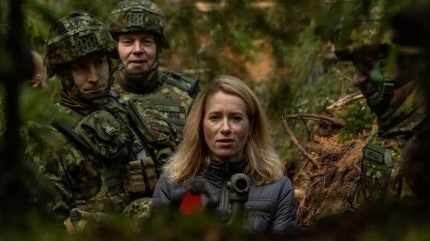
Estonia’s Prime Minister Kaja Kallas is in the running to succeed as the European Union’s (EU) High Representative for Foreign Affairs and Security Policy in the coming months.
“I am honoured by the support of the European Council,” said the Baltic leader on 27 June in a post on the social media platform X. “The next step is… the hearing of the European Parliament – it will be my aim to now reach out to MEPs and achieve their support.”
Kallas – whose formative years were shaped by the Soviet Union, and whose politics now respond to the belligerent Russian President Vladimir Putin – will succeed the Spanish incumbent Josep Borrell in a switch from West to East.
A leading voice for defence expansion and championing Western support for Ukraine in the war against Russia, Kallas’ stance on the security climate is clear.
The High Representative is a diplomatic appointment established by the Treaty of Amsterdam in 1999. It encompasses a range of roles as the title suggests; it includes heading up the European Defence Agency and maintaining European interests on an uncertain and fragile world stage.
Around the same time as Kallas’ nomination the incumbent EU Commissioner Ursula Von Der Leyen, who has served in the top job for the last five years, got the nod for a possible second term.
Defence industrial policy
It seems appropriate that Europe may decide to lean on Estonia’s Prime Minister to lead the EU in what will be a transformational expansion of its collective defence industry over the next five years.
In her social media post Kallas pledged to “work on achieving EU unity, protect the EU’s interests and values in the changed geopolitical context…”
Europe’s close cooperation seeks to drive down procurement time and costs through joint funding, ensure uniformity and interoperability in equipment, and raise the global competitiveness of European defence companies. These objectives will be implemented more systematically following the inauguration of the Union’s European Defence Industry Programme.
Established in March, the organisation will mobilise €1.5bn ($1.63bn) of the EU budget throughout 2025-27 to enhance their defence market competitiveness. The idea is to end their short-term measures since the start of the war in Ukraine for a more structural, longer-term approach to strengthening Europe’s defence industrial and technology base with new objectives.
Baltic threat perception
In close proximity to Russia, the threat perception in the Baltic states is reminiscent to the ‘gathering storm’ of the 1930s, and this has made the region vigilant.
This is reflected in their defence budget data, which GlobalData says grew at a compound annual growth rate of 14.8% between 2019 and 2023 – an eye-watering level of growth that was largest in 2022-23, the same time Russia’s full-scale invasion of Ukraine began.
Moreover, Estonia’s parliament has passed bills committing the country to spending at least 3% of its gross domestic product (GDP) on defence for the 2023-2028 period. The state is on track to exceeding this figure and achieving closer to 4% GDP, demonstrating their unbending commitment.
The Baltic example extends to Lithuania, a country that has just reached 3.03% of GDP of defence spending, having approved the latest additional defence funds of €136m to a budget that now boasts €2.3bn.



